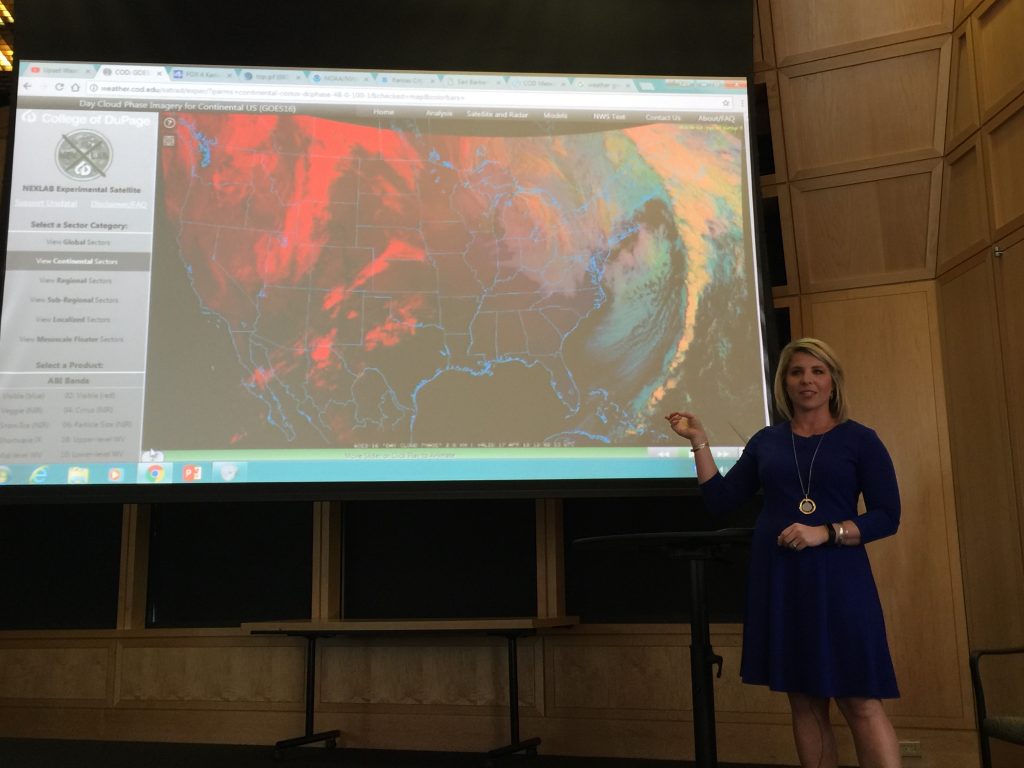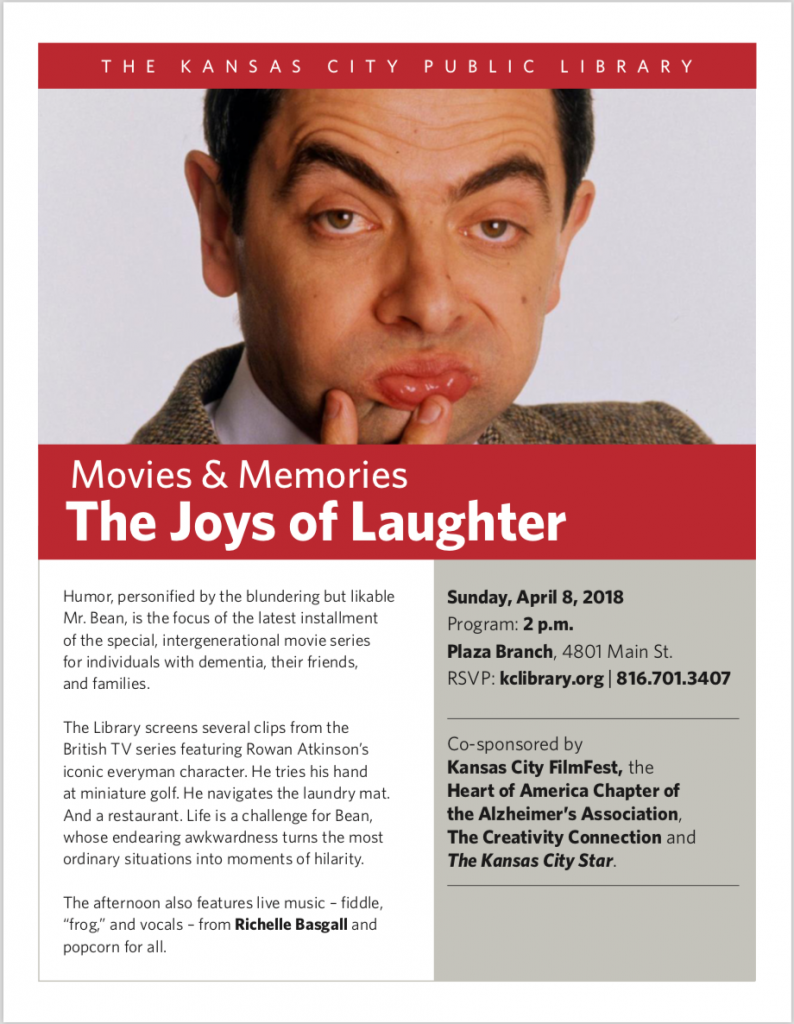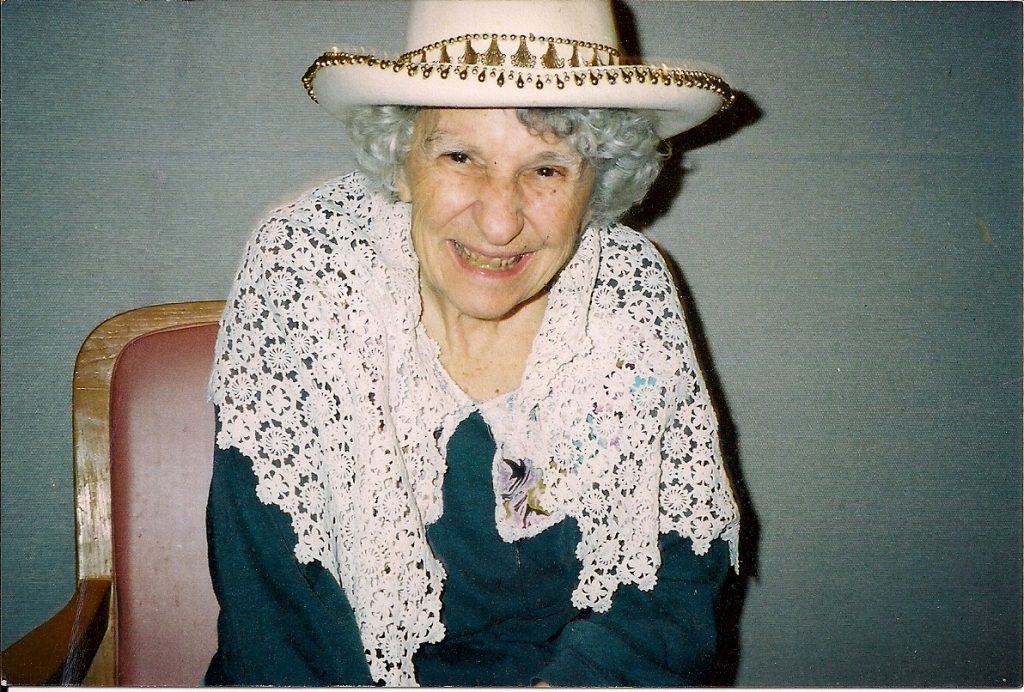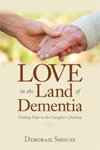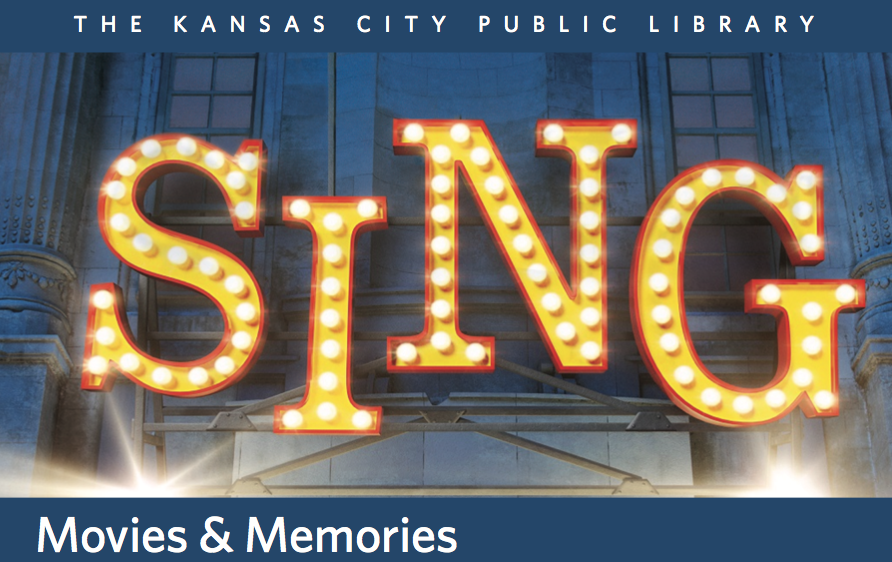Posts Tagged ‘Alzheimer’s Caregiving’
KC Memory Cafe: Great Weather Information Inspires Great Conversations
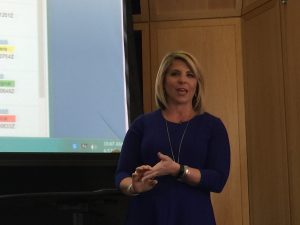 Karli Ritter is a self-described “weather nerd.” When this Fox 4 meteorologist finished her lively talk at April’s KC Memory Cafe, we all had a bit of that “weather nerd” fever in us. We listened intently as Karli described her early morning routine, up at 4:30 a.m., studying the weather maps and data so she could formulate a forecast. She detailed the complexities of being an integral part of a five-hour show: she actually appears on TV 90 times during the Kansas City Fox morning show! Her talk reminded us that great weather information inspires great conversations.
Karli Ritter is a self-described “weather nerd.” When this Fox 4 meteorologist finished her lively talk at April’s KC Memory Cafe, we all had a bit of that “weather nerd” fever in us. We listened intently as Karli described her early morning routine, up at 4:30 a.m., studying the weather maps and data so she could formulate a forecast. She detailed the complexities of being an integral part of a five-hour show: she actually appears on TV 90 times during the Kansas City Fox morning show! Her talk reminded us that great weather information inspires great conversations.
Karli has a love for storms and we were delighted with our “tornado” 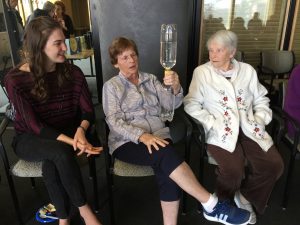 experience, courtesy of the Kansas City Public Library staff. We used a special coupler to link one empty liter bottle with one half full with water. Then we shook and turned it upside down and voila! a little tunnel tornado formed in the water! Each person was fascinated by this experiment. That led us to a conversation about personal weather experiences. Our attendees had gone through hurricanes, earthquakes, dust storms, tornadoes, nor’easter’s and much more.
experience, courtesy of the Kansas City Public Library staff. We used a special coupler to link one empty liter bottle with one half full with water. Then we shook and turned it upside down and voila! a little tunnel tornado formed in the water! Each person was fascinated by this experiment. That led us to a conversation about personal weather experiences. Our attendees had gone through hurricanes, earthquakes, dust storms, tornadoes, nor’easter’s and much more.
Our discussion continued on the way out, with guests describing the varied weather in the Kansas Flint Hills, rainbows they’d seen, family members who loved forecasting the weather, and long hot summers and long cold winters.
To watch our weather wonders, click here.
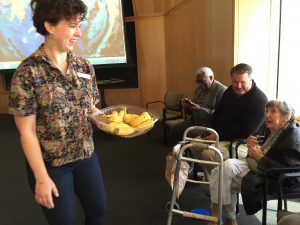
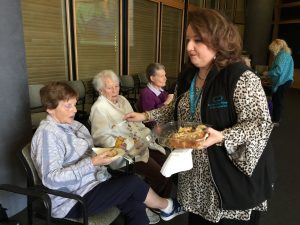 Bringing the weather home.
Bringing the weather home.
To start a weather conversation in your own family or community, use music as a catalyst. Play songs such as: You Are My Sunshine, Stormy Weather, Somewhere Over the Rainbow, Raindrops Keep Falling on My Head, The Sunny Side of the Street, Let It Snow. After each song, ask an open-ended question. “What do you like about snow?” Or,” What seasons do you like most?” Or “Have you ever been in a really big storm?” Or,”What is your favorite kind of weather?”
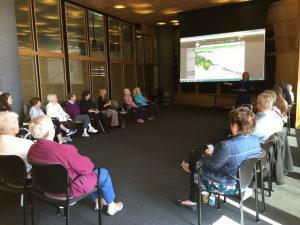
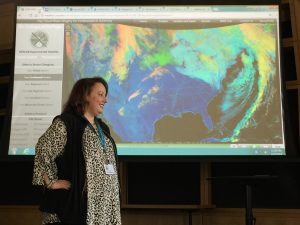 You can also play iconic movie clips that feature weather, such as the joyous tap dancing scene in Singing in the Rain, or the tornado scene in The Wizard of Oz.
You can also play iconic movie clips that feature weather, such as the joyous tap dancing scene in Singing in the Rain, or the tornado scene in The Wizard of Oz.
Dramatic weather photos and pictures can also trigger memories and comments.
Thanks to our Cafe Team and thanks for those who visited.
Our next adventure: May 15, 10:30 to 12:00, Plaza Library
Music to Our Ears: The Kansas City Symphony Brings Us Note-worthy Instruments
You’ve heard them as part of the orchestra. Now you’ll be meeting selected instruments first-hand, as the Symphony’s Margaret Halloin joins us for this delightful interactive session. Enjoy refreshments and interesting conversations as we learn more about the sounds of music.
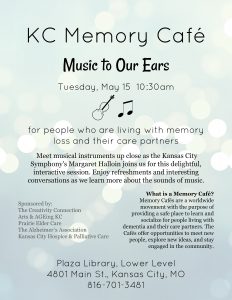
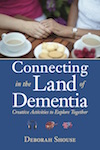
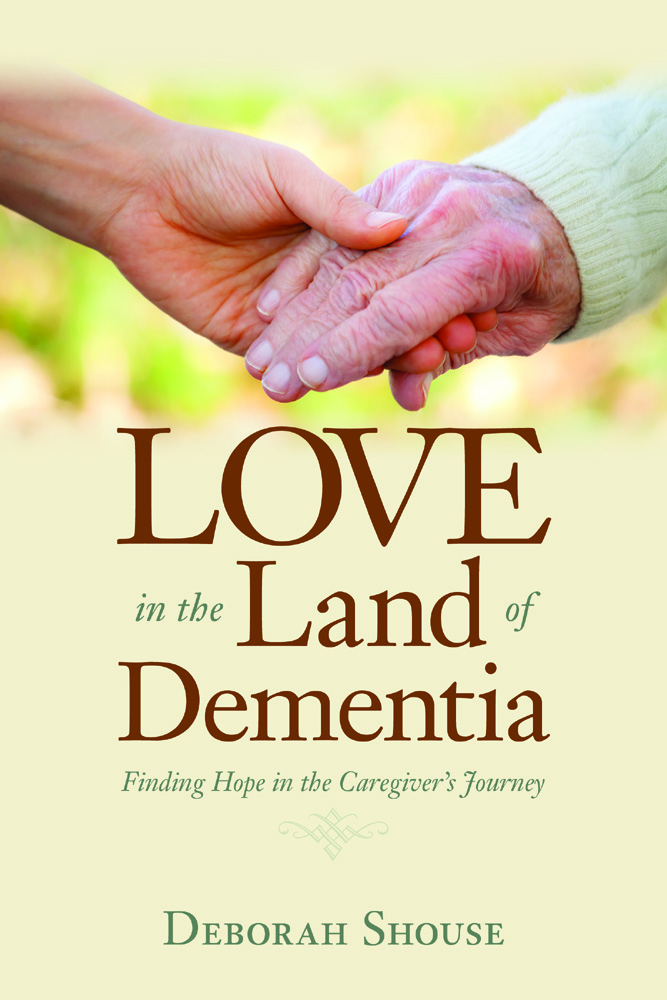
Movies and Memories: Laughter Triumphs Over Weather
It’s a Sunday morning in early April and we were excited about our Movies and Memories laughter program that afternoon at 2:00.
Then, the unthinkable happened. It started to snow, blanketing the daffodils and tulips with just enough flakes to make people want to cozy up at home.
What did we do? Laugh, of course.
Laughter was the theme of our April program and we had excerpts from the inestimable Mr. Bean to anchor our program.
As Emily from the Kansas City Public Library, Plaza Branch, made our popcorn and other library staff readied the technology, we accepted the fact that we might have only our intrepid volunteers in the audience. We all vowed to have a great time anyway.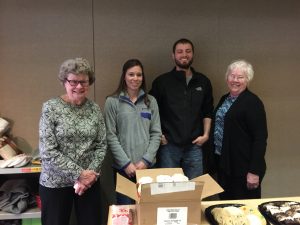
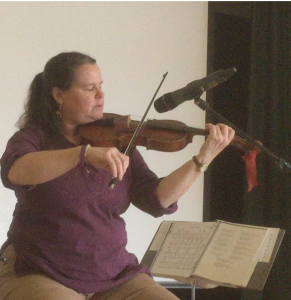 Musician Richelle Basgall regaled us with songs and stories and our guests began to arrive. Soon we had about 30 people who ignored the weather and were ready for fun. And fun we had. One of our volunteers brought us sumptuous cookies and small cakes. The aroma of fresh popcorn warmed us all and we laughed our way through a hilarious clip of Mr. Bean playing miniature golf. Then we passed out jokes, which we laughingly shared with each other. (What kind of sandwiches do astronauts eat: Launch meat! Why did the oil painting get sent to jail? It was framed!)
Musician Richelle Basgall regaled us with songs and stories and our guests began to arrive. Soon we had about 30 people who ignored the weather and were ready for fun. And fun we had. One of our volunteers brought us sumptuous cookies and small cakes. The aroma of fresh popcorn warmed us all and we laughed our way through a hilarious clip of Mr. Bean playing miniature golf. Then we passed out jokes, which we laughingly shared with each other. (What kind of sandwiches do astronauts eat: Launch meat! Why did the oil painting get sent to jail? It was framed!)
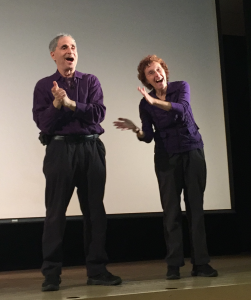 After watching Mr. Bean’s laundromat escapades, we had a laughter yoga session. We didn’t have to worry about traditional physical yoga postures—laughter yoga includes clapping, gestures, playfulness, and breathing. Everyone was a hearty laugher and we were all relaxed and smiling as we watched Mr. Bean’s horror as he tried to cope with raw oysters at a fancy restaurant.
After watching Mr. Bean’s laundromat escapades, we had a laughter yoga session. We didn’t have to worry about traditional physical yoga postures—laughter yoga includes clapping, gestures, playfulness, and breathing. Everyone was a hearty laugher and we were all relaxed and smiling as we watched Mr. Bean’s horror as he tried to cope with raw oysters at a fancy restaurant.
Our ending surprise was a delicious way to take Mr. Bean home— gourmet jelly beans!!
Click here for a short video experience.
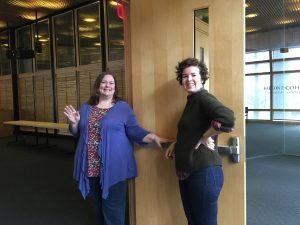 Stay tuned for our next Movies and Memories event in August!
Stay tuned for our next Movies and Memories event in August!
Want to have a movies and memories event right in your own home?
Here are a few tips:
If you’d like to make this an intergenerational experience, select a movie or clips you all might enjoy.
Choose a time of day when the person living with dementia will have good energy.
Get your favorite movie treats ready.
Create times to pause and chat about what you’ve seen.
Print out simple jokes as a great way to spread the laughter.
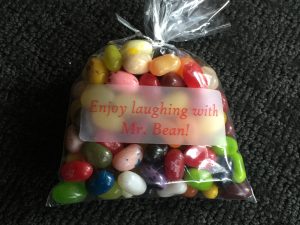 If you wish, offer a surprise at the end, either something that reminds you to laugh or smile. And if you like sweets, our jelly beans were a huge hit! With all those flavors, you have a lot to talk about!
If you wish, offer a surprise at the end, either something that reminds you to laugh or smile. And if you like sweets, our jelly beans were a huge hit! With all those flavors, you have a lot to talk about!


Dementia in the Land of Vietnam
“We are here to see Dr. Nguyen Thanh Binh, head of the Department of Neuroloy and Alzheimer Diseaese,” I tell the guard at the National Geriatric Hospital of Vietnam in Hanoi, showing him my folded paper with her name printed on it.
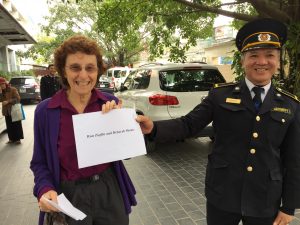 He grins, then points to a full size sheet of paper in the security booth’s window with our names printed on it. We follow him into the hospital and up a flight of stairs. After a short wait, Dr. Binh warmly welcomes us into her office. She has a table ready with chairs and tells us she has invited others from her department to talk to us as well. Another Dr. Nguyen Thanh Binh arrives. Her Phd thesis was on easing the burden for family caregivers. Dr. Ngan Thi Hong Anh, doctor of rehabilitation, joins us. She seeks non-medical solutions for improving quality of life. Nguyen Ngoc Anh, RN, completes our group. She works daily, communicating with and caring for people who are living with dementia.
He grins, then points to a full size sheet of paper in the security booth’s window with our names printed on it. We follow him into the hospital and up a flight of stairs. After a short wait, Dr. Binh warmly welcomes us into her office. She has a table ready with chairs and tells us she has invited others from her department to talk to us as well. Another Dr. Nguyen Thanh Binh arrives. Her Phd thesis was on easing the burden for family caregivers. Dr. Ngan Thi Hong Anh, doctor of rehabilitation, joins us. She seeks non-medical solutions for improving quality of life. Nguyen Ngoc Anh, RN, completes our group. She works daily, communicating with and caring for people who are living with dementia.
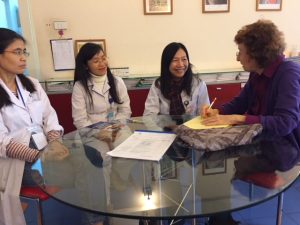 For two years. Dr. Binh and her team have been running a pilot study, inviting people who are living with dementia to attend a three day a week program that focuses on engaging socially, physically, emotionally, and intellectually. They use music therapy techniques, they bake traditional cakes together, and they enjoy various arts and crafts projects. All these therapies offer physical and occupational therapies, as well as vital social interactions. The project has been a huge success, with both family caregivers and people living with dementia enjoying the results. Besides giving the caregivers a much needed respite, families report improved quality of life and and increased abilities in the activities of daily living.
For two years. Dr. Binh and her team have been running a pilot study, inviting people who are living with dementia to attend a three day a week program that focuses on engaging socially, physically, emotionally, and intellectually. They use music therapy techniques, they bake traditional cakes together, and they enjoy various arts and crafts projects. All these therapies offer physical and occupational therapies, as well as vital social interactions. The project has been a huge success, with both family caregivers and people living with dementia enjoying the results. Besides giving the caregivers a much needed respite, families report improved quality of life and and increased abilities in the activities of daily living.
“Symptoms improve,” Dr. Binh reports. “Patients want to keep attending and families have their burdens eased.”
Dr. Binh and her team have extended the program.
 Often people come to the hospital, seeking answers to issues related to memory loss. Many elders live at home with extended families, and their children and grandchildren are frequently confounded by their cognitive impairments and other symptoms of dementia. Dr. Binh and her associates offer education, information, and comfort. They describe the disease and try to help families move beyond their initial feelings of hopelessness. They encourage families to accept and embrace their elder and support him or her in living a meaningful life.
Often people come to the hospital, seeking answers to issues related to memory loss. Many elders live at home with extended families, and their children and grandchildren are frequently confounded by their cognitive impairments and other symptoms of dementia. Dr. Binh and her associates offer education, information, and comfort. They describe the disease and try to help families move beyond their initial feelings of hopelessness. They encourage families to accept and embrace their elder and support him or her in living a meaningful life.
We left our meeting with these remarkable women feeling inspired. They are doing important work and making a difference for the people of Hanoi and Vietnam.


My Mom’s New Holiday Tradition: Smiling
**
We roll into the memory care facility’s dining room just as the show is ready to start. The singer, Thelda, kicks off her shoes and presses play on the boom box. Above the cheerful sound track, she sings Jingle Bells. She dances across the room with the remnants of ballroom steps. She stops in front of Mom and sings right to her. She gets on her knees, so she can look into Mom’s eyes, and keeps singing. Mom notices her and smiles a little.
Thelda moves on, singing to each of the patients gathered around, so intent on making a connection that she often forgets the words.
“Is it all right for your Mom to come to Christmas holiday events?” the activity director had asked me, when Mom moved in.
“Yes, I’d like her to go to any activities. She likes the extra energy.”
I think Mom would approve of my decision, even though she has never celebrated Christmas. Growing up, her immigrant mother held on to the Jewish spirit of her home, kneading dough for Friday evening challah, observing each holiday and prayer period in her own way. Some orthodox women followed the religious law that commanded a small piece of the dough be burned as an offering to God. My grandmother was poor; she did not believe in burning good food, regardless of tradition. So she sacrificed a portion of the dough to her youngest daughter, my mother Fran. She created a “bread tail,” leftover dough that she baked, then smeared with butter and sprinkled with sugar . When Mom used to talk about her mother, she always mentioned this special treat.
Even when I was growing up, and we were the only Jewish family in our neighborhood, my mother still did not sing Christmas song. She let the holiday rush by her, like a large train, whooshing past and leaving her behind.
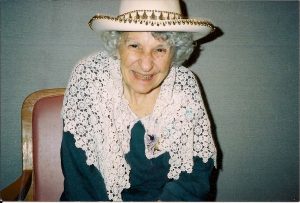 Now, I am singing Christmas carols to my Mom for the first time and she is smiling. She has moved beyond the place where the religions are different, beyond the place where she wants to separate the dough and make a sacrifice for tradition. Her new tradition is anyone who can make her smile.
Now, I am singing Christmas carols to my Mom for the first time and she is smiling. She has moved beyond the place where the religions are different, beyond the place where she wants to separate the dough and make a sacrifice for tradition. Her new tradition is anyone who can make her smile.
With each song, from White Christmas, to Silver Bells, to Frosty the Snowman, Thelda moves back to Mom, tapping her, acting sillier and sillier. Each time, Mom lifts her head and widens her mouth for a second.
For her finale, Thelda puts on a big red nose and sings Rudolph. When she dances in front of Mom with that scarlet nose, Mom laughs, her face a miracle in pure enjoyment. I laugh too, so delighted to see Mom engaged and absorbed.
Two weeks from now, I will bring a menorah and candles into my mother’s room. My father and I will have a short Chanukah ceremony with Mom. She will pick at the shiny paper covering the Chanukah gelt (chocolate candy disguised as money). She will slump over in her chair. But she will come back to life when she sees me, her only daughter, wearing a big red nose as I light the menorah.Here’s to a meaningful and fun holiday season.
I look forward to connecting with you when I resume blogging in early January.


Six Secrets of Dementia Inclusive Holiday Cooking
I named my brother Dan, our head chef, first. Then I included the support team—myself, my mom, my daughters and nephews.
“Did I help?” Mom whispered as I passed her the mashed potatoes.
“You sure did,” I told her. ”You mashed the potatoes, put the marshmallows on the sweet potato casserole, and mixed the fruit salad.”
“That’s good,” she said. “I like to help.”
Our desire to help and contribute to seasonal celebrations doesn’t end with a diagnosis of dementia. It’s lovely to linger in the kitchen together, preparing food for the holidays. It’s even lovelier when you can adapt and enjoy dementia inclusive holiday cooking so that people of varying abilities can participate.
Rebecca Katz, author of The Healthy Mind Cookbook, sees food as a great equalizer, something anyone can enjoy regardless of abilities. Fixing a delicacy for someone offers a tangible and delicious way to give back.
Here are six secrets of iementia Inclusive holiday cooking.
- Leaf through a favorite family cookbook or recipe box and use the pictures and recipes as a catalyst for conversation. Ask open-ended questions, such as, ”What does that brownie recipe make you think of?” “What do you like about the holiday season?”
- Chose a time of day when you’re both rested.
- Create a comfortable kitchen environment, by playing familiar seasonal songs you can both hum or sing along to. Reduce extraneous noise and distractions, such as a television in the background.
- If you wish, take photos during the experience. That way, you can relive the adventure and share with family and friends.
- Indulge in instant gratification, if possible, by sampling your work when the cooking is complete.
- Even if the person living with dementia can’t help prepare food, he can still enjoy sitting in on the action and the conversation.
Whether you’re stirring a pot of orzo or dropping mint leaves into cool water, enjoy your time of creation and connection in the kitchen.
A longer version of this piece originally appeared on Joan Lunden’s excellent website: Enjoy Dementia Inclusive Holiday Cooking. Thanks to Sue Fitzsimmons, MS, ARNP, Judith Fertig, author of The Memory of Lemon, Kate Pierce, LMSW, Alzheimer’s Association Greater Michigan Chapter, and Rebecca Katz, author of The Healthy Mind Cookbook
Deborah Shouse is the author of Connecting in the Land of Dementia: Creative Activities to Explore Together and Love in the Land of Dementia: Finding Hope in the Caregiver’s Journey.
Insider Dementia Friendly Travel Tips, from Laurie Scherrer
This year, Laurie Scherrer is taking a number of trips: Atlanta, to speak at a conference, South Carolina, for a family reunion, and the Caribbean, as a speaker and participant in a dementia-friendly cruise. Since she is living with early onset dementia, Laurie plans out her trips, taking into consideration her needs and the chaos that can be a natural part of any journey. Here are some insider dementia friendly travel tips from Laurie.
Planning for a Smooth Flight
Laurie contacts TSA and her airline, notifying them of her disability, so they can mark it on her ticket. She and her husband both paid for a TSA pass, so they can go in together. That helps her avoid the bombarding noise, distraction, and exhausting wait inherent in a long check-in line
“The TSA staff will walk you through the line,” she says.
Laurie is sensitive to noises, so the constant airport announcements, the din of hundreds of conversations, and the drone of background sounds present challenges.
“I walk into a restaurant and I hear the clanging of the dishes, the forks on the plates, the waiter’s shoes thudding against the floor,” she says. “I have lost my ability to filter sound, and those noises are as strong as any conversation I’m having.”
To minimize distraction and confusion and to help her concentrate, Laurie often wears noise-cancelling headsets.
Once in the airport, she tries to find a quiet place to sit.
“I don’t sit at the gate for two hours with a slew of people,” she says. “Sometimes a restaurant or bar is quiet. For overseas trips, you can try to get access to an airport lounge.”
She tries to get a seat towards the front of the plane, to avoid additional waiting and wading through a crush of passengers.
Packing it Up
Two weeks before a trip, Laurie organizes her clothes for each day. She puts on an outfit, then takes a picture of it.
“On the picture I write, ‘Purple shirt, black slacks, white sneakers, white socks, etc.,’” she says. “Then when I pack, I put each day’s entire outfit together, including socks and underwear. That makes getting dressed so much easier.”
Getting Oriented
At any new hotel, Laurie and her husband walk around the entire building so Laurie can get oriented. When she is traveling alone, she talks to the hotel manager, to explain her situation. At one lodge, the receptionist escorted Laurie to her room and helped her unpack. Laurie carries a tag with her name and room number on it, in case of sudden confusion.
“Don’t be afraid to ask for help,” she says.
Taking Breaks
Laurie has already planned her quiet time and her personal getaways for the upcoming cruise, where she is both a traveler and a speaker/educator.
“On cruise ships, the library is often a quiet haven,” she says.
She also avoids group shore excursions, as it is hard for her to enjoy being in a crowd.
But it’s not hard for Laurie to relish travel and to revel in engaging in new experiences and meeting new people. It just takes a little planning and a lot of taking care of herself. #
To learn more about Laurie, visit https://dementiadaze.com/about-me/


Widening the World Through Travel
As the waiter served dessert, Lori La Bey looked around the table at her family and smiled. She couldn’t believe she had pulled this off — her children, her siblings and their children, and her parents all enjoying a Caribbean cruise together. Her mother was living with Alzheimer’s and her father had brain cancer: they had assumed they wouldn’t get to travel again. They were beaming and Lori knew all her planning had been worth it. She was widening the world through travel.
She still treasures the family pictures from this trip. This meaningful travel experience inspired Lori, founder and host of Alzheimer’s Speaks, to orchestrate a cruise for people who are living with dementia and their families.
“Travel is a normal part of life,” Lori says. “When you stop traveling, your world becomes smaller.”
From her years caring for her mom, Lori understands how easy it is to feel isolated and stuck. She also understands the joy of engaging in the world, trying new things, and meeting new people. Her trip enriched her family and she wants to offer others that gift of connection and adventure.
Lori also learned some tips from traveling with her parents. Here are a few ideas for creating a smooth traveling experience for yourself and for someone who is living with dementia:
Create a flexible travel experience. Lori chose cruising because it can be reasonably priced, you can unpack once and stay in the same room the entire trip, and there’s lots of flexibility with eating (including free room service), activities, and touring. Cruising is also ideal for the intergenerational experience, offering activities for all ages.
Make the person living with dementia part of planning the trip. Discuss the trip with all involved, asking for feedback and talking about what each person really wants to do. Incorporate those dreams into the trip.
Empower your travelers. Lori packed all her parents things into one giant suitcase. Her father had always been the one managing the luggage and he really wanted something to carry. “I hadn’t thought to pack a couple of small bags so he and my mom could feel like regular travelers,” Lori says. “People want something to be in charge of so they don’t feel left out.”
Work with a travel agent and make your life easier. Plan in advance for noise, long transfers, layovers, long car rides, and other chaos. If flying, call the airport if you need to arrange for wheelchairs or other inner airport transportation. To mute noises, bring earplugs. Carry along items that soothe and comfort each of us, including favorite music and head phones. If you’re cruising, talk to the cruise lines in advance, discussing special needs, including dietary, medical, and any mobility issues.
Take pictures and videos and document these precious moments. You’ll enjoy looking through these memories again and again together.
“Travel is about being together and widening your world,” Lori says. “It’s a wonderful way to build those moments of magical and meaningful connection.”

For an amazing way to widen your world, consider Lori’s upcoming November Dementia Friendly Conference and Cruise. Lori and a team of educators, including a panel of inspiring people who are living with dementia, have planned a nurturing, connecting, educational, and inspiring Caribbean trip. For more information, visit, https://alzheimersspeaks.com/cruise-with-us
How to Create Better Connections in the Land of Dementia
Ron and I both love helping people create better connections in the land of dementia. We are enjoying the second year of our meaningful Movies and Memories film series. Our next free movie events (and I say “events’ because there is so much more than just sitting and watching a film) are September 10 and November 5. Please tune into Kansas City Live on KSHB-TV on Thursday, September 7 during the 10:00 hour, for additional details.
I was delighted to be featured on Mike Good’s Together in This recent podcast. Mike is a gifted interviewer, with an authentic voice and a true commitment to help people stay better connected. I so enjoyed our time together and wanted to share the interview with you.
Recently, we have been connecting through creating laughing classes for caregivers, elders, people who are living with dementia, and others. We love going around to care communities and laughing with community members, family, and staff. Our next public laughter presentation is at the Landon Center, on October 18 at noon. It’s free and open to the public. If you’re in the Kansas City area, please come laugh with us. It’s great fun!
I was honored to have a book excerpt featured on Maria Shriver’s website. Maria does amazing work and her new book, Color Your Mind, is a visual and information treat, full of inspiring ideas.
I was thrilled when a story of mine was accepted by Chicken Soup’s The Dog Really Did That? The story honors Ron’s mom, Mollie, and her love for a dog named Biscuit. If you have a chance, read my story and so many other great essays in this inspiring book.
Finally, thanks to Mary Anne Clagett of Creative Forecasting, a publication for Activities Professionals. She is featuring a review of Connecting in the Land in their November issue. The publication brims with interesting ideas for creative and meaningful activities.
There are so many ways to Create Better Connections in the Land of Dementia, and as you can see, there is power in sharing stories, laughter, and the arts.
Let’s Go to the Movies: A Dementia-Friendly Series
“Let’s go to the movies,” my dad often said to my mom. My parents would have loved our Movies and Memories series, now starting its second year. We are excited to announce our partnership with the Kansas City Boys Choir and the Kansas City Girls Choir this season. Some of their outstanding performers will be joining us at each event.
Already, the series is making a difference in a variety of ways. Additional libraries in Missouri and other states are interested in implementing the program. And our library is so committed to becoming more dementia-friendly that it is having special training for its staff, courtesy of the Alzheimer’s Association — Heart of America Chapter. Please share this invitation with those who would enjoy it. And if you’re in the Kansas City area, please join us. It’s free and open to all. Let’s go to this movie series!
Enrich Life by Adapting Hobbies
We all want to be engaged in purposeful and fun activities. When we enrich life by adapting hobbies, we help people living with dementia stay engaged in activities that are meaningful and interesting to them.
Discover What’s Most Important
To adapt hobbies, ask yourself: What is most important about the activity?
For example, for gardeners, is it the feel of their hands in the soil? Is it producing flowers or harvesting vegetables? Is it having something to take care of?
For those who like quilting, is it the finished product or making the squares? Is it the companionship with other quilters? Or the texture and colors of the fabric?
For those who like cooking, is it the measuring and stirring? Do they enjoy the aromas and textures of the ingredients? Is it the joy of preparing something that thrills others? Or is it the simple pleasure of tasting delicious foods?
With those answers, you can support the aspects of the activity that really resonate. You can enrich life by adapting hobbies.
Here is a story about adapting your attitude.
Embrace the New News
That Tuesday morning, she walked into the kitchen and saw her husband, relaxed in his chair, drinking his morning coffee, and reading the newspaper. He loved his morning ritual and everything was as it always had been. Except now he was holding the newspaper upside down. At first, she was upset, angry that dementia had robbed him of reading. As she battled with her feelings, he hummed, a sign he was happy and content. She took a breath and realized, she too should be happy and content.
Go for the Greens
I love this story from Mara Botoni, author of When Caring Takes Courage. Here’s how she kept her grandfather, who was living with dementia, involved in his golf game. For a time, he walked the golf course and played with empathetic friends. When he could no longer play, he liked being driven around the course, enjoying the scent of freshly mown grass, the vistas of rolling green lawns, and the thwack of a well-hit ball. Later, at home, the family set up an indoor putting green and watched golf tournaments on television with him.
Deborah Shouse is the author of Connecting in the Land of Dementia: Creative Activities to Explore Together and Love in the Land of Dementia: Finding Hope in the Caregiver’s Journey.
